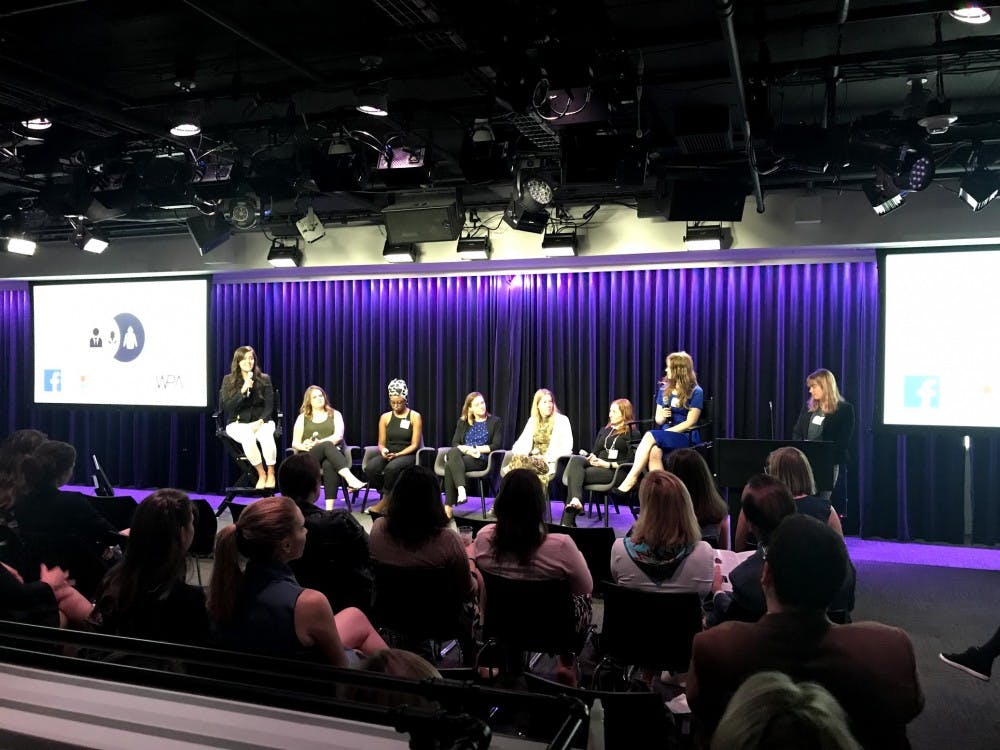December 2017 graduate Emma Harrison, who worked on the original Washington Experience project, stayed on the team, and then-senior Jordan Townsend, an interested student not formally enrolled in the course, also joined the research team.
Throughout the semester, the undergraduate students analyzed a dataset of 995 political tech staffers who worked on presidential campaigns from 2004 to 2016. In addition, they interviewed 45 women who worked on 12 different campaigns from 2008 to 2016.
Their findings were compiled into an 80-page report titled “Recoding the Boys’ Club: Women vs. the Political Tech Ceiling.”
The researchers found that the understaffing of women political tech staffers on presidential campaigns is a bipartisan issue – from 2004 to 2016, 65 percent of Democratic staffers and 76 percent of Republican staffers were men.
The women interviewed listed a number of reasons why men in political tech were hired more on presidential campaigns, including “time-constrained hiring processes, male-dominated political networks and gendered stereotypes about women’s competencies,” according to the report.
The report also includes recommendations, from both the researchers and the women interviewed, to help close the gender gap among political tech staffers.
“Campaigns can prioritize deliberate hiring aimed at achieving gender equity and diversity and develop new accountability mechanisms to create more inclusive environments,” the researchers wrote in the report.
On May 10, 2018, the team drove from Chapel Hill to D.C. to present at Google. Around 100 people attended the presentation, many of which were women who had worked on presidential campaigns. The students presented their findings in groups of two and a panel discussion followed. The event was sponsored by Facebook, Microsoft and WPAi, a political intelligence company.
“That day was both the shortest and longest day of my entire life,” senior Jenni Ciesielski said. “If someone were to pay me $1,000 to remember what I said at the conference, I couldn't, I couldn't do it.”
Despite Ciesielski's nerves, Kreiss said his students’ presentation was “riveting.”
“Not only did they chart patterns over time and opportunities for career advancement, they also provided a lot of the interview data where women talked about their experiences on campaigns – everything from being excluded from important meetings to sexual harassment,” Kreiss said. “The audience was very engaged. There were lots of groans in response to bad male behavior and other anecdotes that the women brought in.”
The morning after the presentation, the report was included on Poynter’s “What we’re reading” list.
To get the day's news and headlines in your inbox each morning, sign up for our email newsletters.
“This is a groundbreaking report," Kreiss said. We were the first research team to systematically study this across a four election cycles. I think for a lot of women in the audience, it confirmed in a systematic fashion what their own personal experiences were.”
And the study didn’t just confirm female campaign staffers’ shared experiences, throughout the entirety of the project, the student researchers discovered similarities between anecdotes shared by their interviewees and their own experiences.
“We would talk about imposter syndrome, or why women don’t apply for things unless they are 100 percent qualified,” Ciesielski said. “All of us could apply at least one thing in every interview to our lives in some way. There was typically a very mutual understanding of what they were going through.”
Not only did the interview subjects reaffirm to the student researchers that they were not alone in their experiences, they also provided career advice.
“One of my favorite pieces of advice that I've gotten from the research, is to validate the shit out of each other,” senior Brinley Lowe said. “That means uplifting the other women who you work with and letting them know that you think they’re wonderful and doing great work.”
Since May, seven of the presenters have graduated from UNC. Ciesielski, Lowe and Gabrielle Micchia are seniors in the process of writing a book based off of the report, with the help of Kreiss and Adams.
“We know that there hasn't been any other books that have been dedicated solely to the political tech space and women's experiences in it, and we thought it was an important story to get out to help start the conversation heading in to 2020,” Kreiss said.
Similar to their reaction to presenting at Google DC, for Ciesielski, Micchia and Lowe, working on a book as undergraduate students is an unfamiliar and oftentimes nerve-wracking experience.
“It feels bizarre," Lowe said. "I never predicted that this would be a reality for me, especially at such a young age. It’s a little bit like imposter syndrome, but as the women in our research have said, it’s important to know that you are smart, intelligent and that you're not an imposter. You've got these things.”
Kreiss said the full manuscript off the book is expected to be finished by the end of the semester, with hopes to have it published and for sale by spring 2020.
“This has made me feel more comfortable being vocally passionate about gender equity,” Ciesielski said. “Doing these interviews and now being able to list off 40-plus women who are extremely successful in political tech, I realize that it shouldn’t be just a boys’ field.”
@ArabellaSau
university@dailytarheel.com




